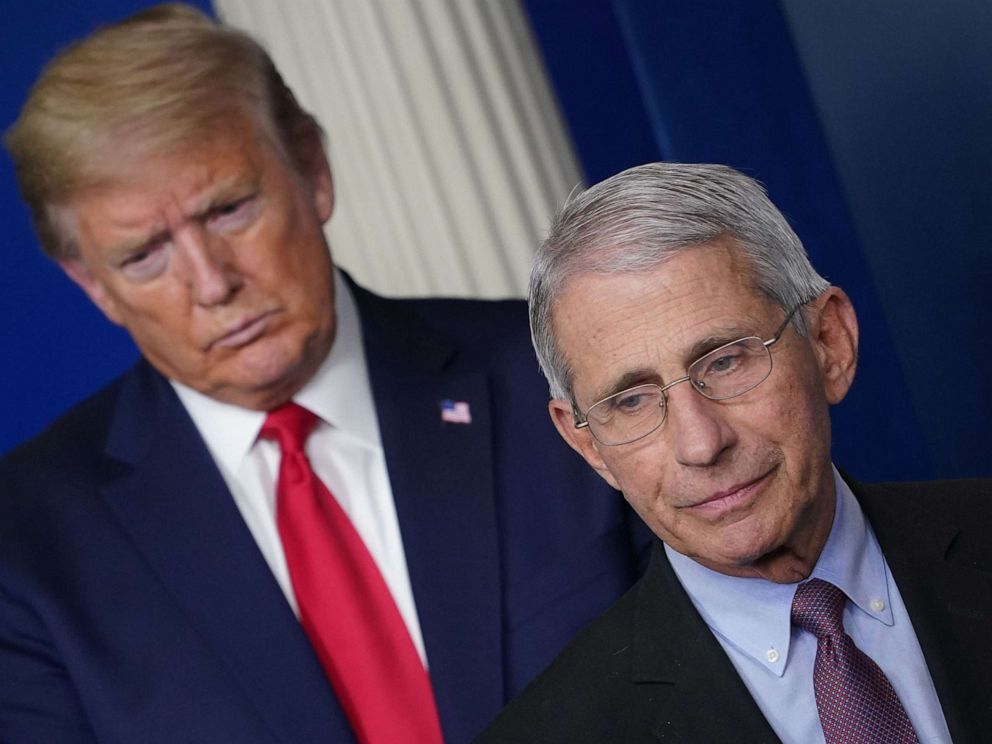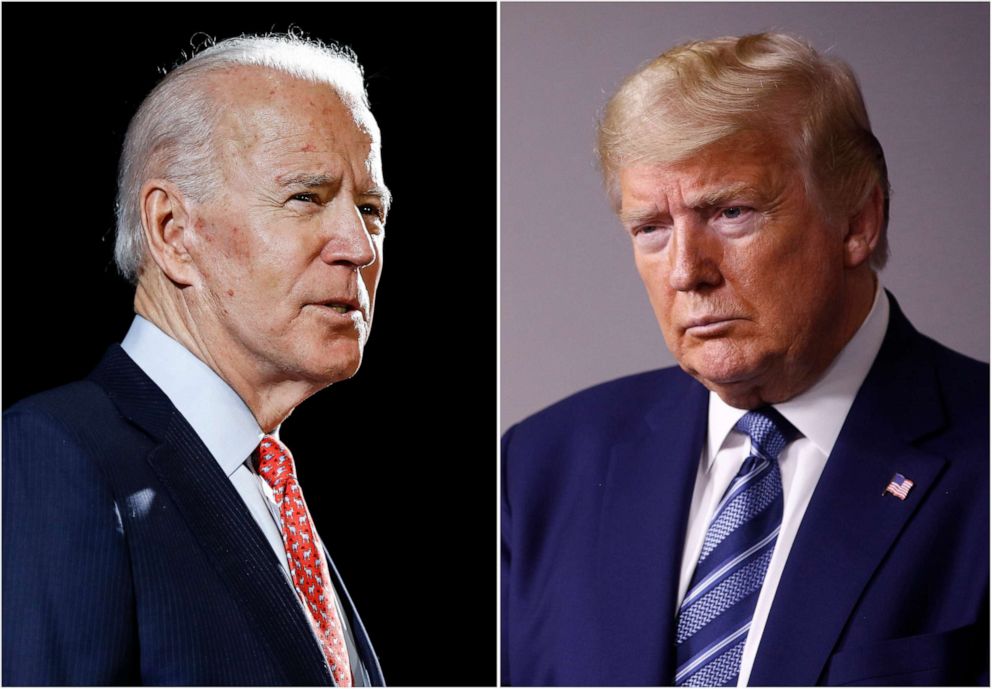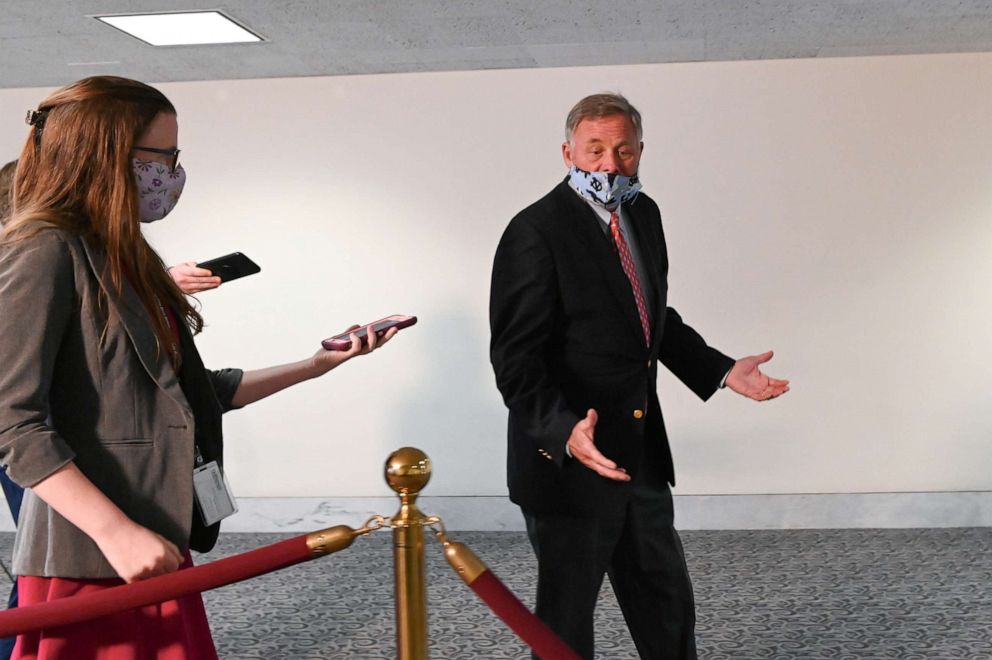The Note: Public not seeing pandemic realities Trump is describing
We have prevailed,” President Donald Trump declared this week.
The TAKE with Rick Klein
"We have prevailed," President Donald Trump declared this week, in a comment he said was about COVID-19 testing.
"I think you should absolutely open the schools," he said two days later, contradicting Dr. Anthony Fauci's warning that it may not be realistic to expect schools to be open this fall.
Both statements contradict high-profile individuals inside Trump's administration, and fly in the face of basic science to at least some extent. Perhaps just as importantly, in a political context, they contradict how the public is experiencing this crisis.
New ABC News/Ipsos polling out Friday morning shows a country that remains hesitant to resume regular life, even as state and local restrictions begin to get lifted -- either by executive action or court order.
Seventy-three percent of Americans say there are not enough coronavirus tests available in the United States, notwithstanding Trump's claim. And 69% of parents with children living at home say they aren't ready to send them back to school, on top of the large majorities hesitant to return to restaurants, movie theaters, bowling alleys and the like.

The president this week has sought out familiar enemies -- Democratic governors, former President Barack Obama, members of the media -- in a bid to redefine the conversation around his re-election campaign.
"You have to get your governor of Pennsylvania to start opening up a little bit," the president said Thursday in Allentown, in an official visit that was reminiscent of a campaign rally.
He has an opponent in former Vice President Joe Biden who is trying not to take his bait. As the president spoke, Biden counter-programmed with a "virtual roundtable" featuring the Democratic governors of Michigan, New Jersey and Connecticut, talking with them about their challenges in confronting the coronavirus.
"We're not going to be out of it before we have a vaccine," Biden said.
What's on display, again, is two candidates talking to what amounts to two different nations when it comes to political perceptions and allegiances.
But what's also evident is that COVID-19 is defining realities on its own, without depending on political messaging.
The RUNDOWN with MaryAlice Parks
As Americans continue to suffer the loss of loved ones and navigate historic unemployment, Trump's team has, on the sly, ramped up their negative ads against Biden online.
In a new, massive and expensive set of campaign ads that started running online this week, the Trump team has worked to portray Biden as old and senile by amplifying recent gaffes he has made while also painting him as soft on China.

Some of the president's own aides fear how the virus, which has hit elderly Americans particularly hard, could impact the president's support from senior citizens. Put another way, the health care crisis could make these attacks against Biden even more risky and potentially insensitive right now.
Of course, Democrats have lobbed their fair share of attacks back at the White House the last few months -- accusing the president of incompetent and lopsided leadership during the pandemic.
We used to think that nothing could bring a country together like a crisis, but that thinking feels increasingly like a vestige of a bygone era.
The TIP with Alisa Wiersema
The decision to give up a top leadership position may be the most painful move any high-profile politician can make, both personally and in relation to his or her political party. After resigning as chairman of the Senate Intelligence Committee, Sen. Richard Burr is now left to bear the potential burden of that kind of decision. The temporary move comes amid a Justice Department investigation into stock trades the senior North Carolina senator made prior to the market's plunge from the spread of coronavirus, and while it indicates a dramatic escalation in the probe as it relates to Burr himself, it also has the potential to cast a party-line shadow over his fellow tar heel, Sen. Thom Tillis.
Tillis is defending his Senate seat against Democrat Cal Cunningham in one of the nation's toughest Senate races. Burr has two years left in his term and has said in the past that he won't run again after this term expires.

"If he has any sense of decency left, Burr will resign immediately, and if they have any regard for the rule of law, Republicans across this state and all over our country will demand the same," North Carolina Democratic Party Chairman Wayne Goodwin said in a statement.
Burr said he is cooperating with authorities and has done nothing wrong. He also told reporters Thursday that he intends to serve his full term. But even if there is no indication that voters would be inclined to associate Tillis with the controversy surrounding his North Carolina colleague, the party battle lines seem to be already drawn.
ONE MORE THING
As more and more states and communities ease restrictions to jumpstart the reopening process, strong majorities believe the country lacks sufficient testing and are also skeptical about returning to pre-pandemic activities, including sending kids back to school, a new ABC News/Ipsos poll released Friday finds.
BRINGING AMERICA BACK
Testing, tracing and treating -- the University of Arizona gave ABC News a first look at how the school plans to return to in-person learning this fall. Read this story and more by checking out Bringing America Back, an ABC News feature that highlights the day's top stories in economic recovery and medical preparedness amid the coronavirus pandemic.
THE PLAYLIST
ABC News' "Start Here" Podcast. Friday morning's episode features ABC News' Anne Flaherty, who walks us through the new CDC guidance for states looking to reopen. ABC News Chief Justice correspondent Pierre Thomas explains why Sen. Richard Burr resigned as chair of the Senate Intelligence Committee amid an FBI investigation. And, ABC News Senior Investigative reporter Aaron Katersky and ABC News contributor John Cohen catch us up on the saga of retired Gen. Michael Flynn. http://apple.co/2HPocUL
Five Thirty Eight Politics Podcast. As COVID-19 has spread across the globe, so have conspiracy theories about the origin and severity of the virus that causes it. In this installment of the FiveThirtyEight Politics podcast, political scientist and conspiracy theory researcher Joseph Uscinski joins Galen Druke and senior science writer Maggie Koerth to discuss why these theories develop and whether they can be stopped. https://53eig.ht/2Jb12X2
WHAT YOU NEED TO KNOW THIS WEEKEND
Download the ABC News app and select "The Note" as an item of interest to receive the day's sharpest political analysis.
The Note is a daily ABC News feature that highlights the day's top stories in politics. Please check back Monday for the latest.




